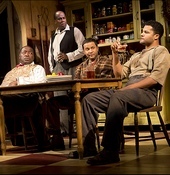SITE GUIDE
SEARCH
REVIEWS
REVIEW ARCHIVES
ADVERTISING AT CURTAINUP
FEATURES
NEWS
Etcetera and
Short Term Listings
LISTINGS
Broadway
Off-Broadway
NYC Restaurants
BOOKS and CDs
OTHER PLACES
Berkshires
London
California
New Jersey
DC
Philadelphia
Elsewhere
QUOTES
TKTS
PLAYWRIGHTS' ALBUMS
LETTERS TO EDITOR
FILM
LINKS
MISCELLANEOUS
Free Updates
Masthead
A CurtainUp Review
The Piano Lesson†
By† Simon† Saltzman
|
"Berniece talking about what she seen. She say Sutterís ghost standing at the top of the stairs. She ainít just make all that up." — Doaker † "She up there dreaming. She ainít seen no ghost. "— Boy Willie " "— |

Chuck Cooper, James A. Williams, Jason Dirden and Brandon Dirden
(Photo credit: Joan Marcu) |
† Attesting to a rich family history are the faces of railroad employee Doakerís (James A. Williams) grandparents sculptured on the piano, the most prized family possession. The playís central conflict arises when Doakerís widowed niece Berniece (Roslyn Ruff) refuses to even consider selling the virtually un-played piano so that her brother Boy Willie (Brandon J. Dirden) can buy land on the property once owned by their familyís slave-master.
† Carved out of sorrow by the great-grandfather whose wife and child were sold to another master in exchange for the piano, the piano has become a family symbol, forever rooted in the memories of separation, pain and even death. Accompanied by his fugitive friend Lyman (Jason Dirden, who is Brandon Dirdenís real-life brother), Boy Willie has arrived from the South with a truckload of ripe watermelons to sell — and a dream of finally buying his own farm with the accumulated proceeds that he hopes will include money from the sale of the piano. (Going forward I will refer to the Dirden brothers by their first names).
† Both family friends and others, including Bernieceís 11 year-old daughter Maretha (Alexis Holt), Wining Boy (Chuck Coooper) Doakerís Sportiní Life-like brother, and Boy Willy and even Lymonís trollop-for-a-night Grace (Mandi Masden), get a good tossing about thanks to Wilsonís intriguing, ghost-embedded plot. Santiago-Hudsonís keenly focused direction is at its best when it strays either romantically or whimsically from its course. There are just enough bluesy musical interludes to off-set the playís tendency toward narrative excess and its three-hour length.
† The rather hokey but theatrical exorcismic resolution is notably enhanced by lighting designer Rui Rita who dramatically casts his unsettling lights and shadows on lives once torn apart, now braced for a cataclysmic renewal. Boy Willie may be a little more than a hurly-burly bag of wind, but Brandon makes us see him as poignantly heroic. Jasonís performance as Lymon is graced by a disarming charm, especially in the light of his unfortunately misplaced romantic gestures toward the vulnerable Berniece.
† Williams is terrific as Doaker, the familyís stabilizing force. Ruff, who appeared in Wilsonís Seven Guitars at the Signature, and so memorable for her performance in the film The Help, never misses a beat of Bernieceís haunted heart.
There are also fine performances by Eric Lenox Abrams, as Bernieceís preacher-suitor and Holt as Bernieceís daughter. The humorously captivating performance of Cooper as the hustling piano-playing Wining Boy is no figment of the imagination. Within the canon of Wilsonís plays that cover the African-American experience in the 20th century, and particularly those in which the natural world is invaded by the supernatural, the characters of The Piano Lesson (the 4th play in the cycle) perhaps strike the clearest and brightest notes.
† For more about August Wilson and links to other plays by him reviewed at Curtainup, see our August Wilson Backgrounder
|
The Piano Lesson † By August Wilson † Directed by Ruben Santiago-Hudson † Cast: James A. Williams (Doaker), Brandon J. Dirden (Boy Willie), Jason Dirden (Lymon), Roslyn Ruff (Berniece), Alexis Holt (Maretha), Eric Lenox Abrams (Avery), Chuck Cooper (Wining Boy), Mandi Masden (Grace). † Scenic Design: Michael Carnahan † Costume Design: Karen Perry † Lighting Design: Rui Rita † Sound Design: David Van Tieghem Original Music: Bill Sims Jr. † Running Time: 3 hours including intermission † The Irene Diamond Stage at the Pershing Square Signature Theater (212) 244 Ė 7529 † Tickets: All tickets for the initial run of the production are $25 as part of the Signature Ticket Initiative: A Generation of Access. Tickets for the final added week are $75. † Performances: Tuesday Ė Fridays at 7:30 PM; Saturdays at 8 PM; Matinees Wednesday, Saturday, Sunday at 2 PM. † From 10/30/12; opening 11/18/12; closing 12/07/12 -- extended and now closing 1/13/13 † Review by Simon Saltzman based on performance 11/17/12 |
|
REVIEW FEEDBACK Highlight one of the responses below and click "copy" or"CTRL+C"
Paste the highlighted text into the subject line (CTRL+ V): Feel free to add detailed comments in the body of the email. . .also the names and emails of any friends to whom you'd like us to forward a copy of this review. Visit Curtainup's Blog Annex For a feed to reviews and features as they are posted add http://curtainupnewlinks.blogspot.com to your reader Curtainup at Facebook . . . Curtainup at Twitter Subscribe to our FREE email updates: E-mail: esommer@curtainup.comesommer@curtainup.com put SUBSCRIBE CURTAINUP EMAIL UPDATE in the subject line and your full name and email address in the body of the message. If you can spare a minute, tell us how you came to CurtainUp and from what part of the country. |

Slings & Arrows- view 1st episode free
 Anything Goes Cast Recording
Anything Goes Cast RecordingOur review of the show
 Book of Mormon -CD
Book of Mormon -CDOur review of the show

